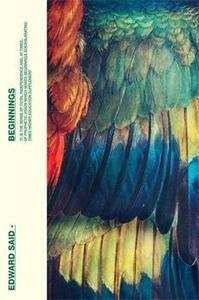Beginnings, Intention x{0026} Method

Editorial Granta Books
Fecha de edición agosto 2012
Idioma inglés
EAN 9781847085993
448 páginas
Libro
encuadernado en tapa blanda
Resumen del libro
A "beginning," especially as embodied in much modern thought, is its own method, Edward Said argues in this classic treatise on the role of the intellectual and the goal of criticism. Distinguishing between "origin," which is divine, mythical, and privileged, and "beginning," which is secular and humanly produced, Said traces the ramifications and diverse understandings of the concept of beginning through history. A beginning is a first step in the intentional production of meaning and the production of difference from preexisting traditions. It authorizes subsequent texts it both enables them and limits what is acceptable.
Drawing on the insights of Vico, Valery, Nietzsche, Saussure, Lévi-Strauss, Husserl, and Foucault, Said recognizes the novel as the major attempt in Western literary culture to give beginnings an authorizing function in experience, art, and knowledge. Scholarship should see itself as a beginning as a uniting of theory and practice. Said's insistence on a criticism that is humane and socially responsible is what makes Beginnings a book about much more than writing: it is about imagination and action as well as the constraints on freedom and invention that come from human intention and the method of its fulfillment.
Biografía del autor
x{0026}lt;P x{0026}lt;B Edward W. Saidx{0026}lt;/B (1935-2003) fue uno de los intelectuales árabes más importantes del siglo XX. Nacido en Jerusalén en una familia palestina, se educó en el Victoria College de El Cairo, en el Mount Hermon School de Massachusetts y en las Universidades de Princeton y Harvard. Fue profesor de literatura inglesa de la Universidad de Columbia desde 1963 hasta su muerte. Además, en 1974 fue profesor visitante de literatura comparada en Harvard; en 1975-76, miembro del Center for Advanced Study in Behavioral Science de Stanford, y en 1979, profesor visitante de humanidades en la Universidad de John Hopkins. Fue director del Arab Studies Quarterly y miembro del Council on Foreign Relations de Nueva York, de la Academy of Literary Studies y del PEN. Entre múltiples premios recibió el Premio Bowdoin de la Universidad de Harvard y el Lionel Trilling Award en 1976, así como el Príncipe de Asturias en el año 2002.x{0026}lt;/P








